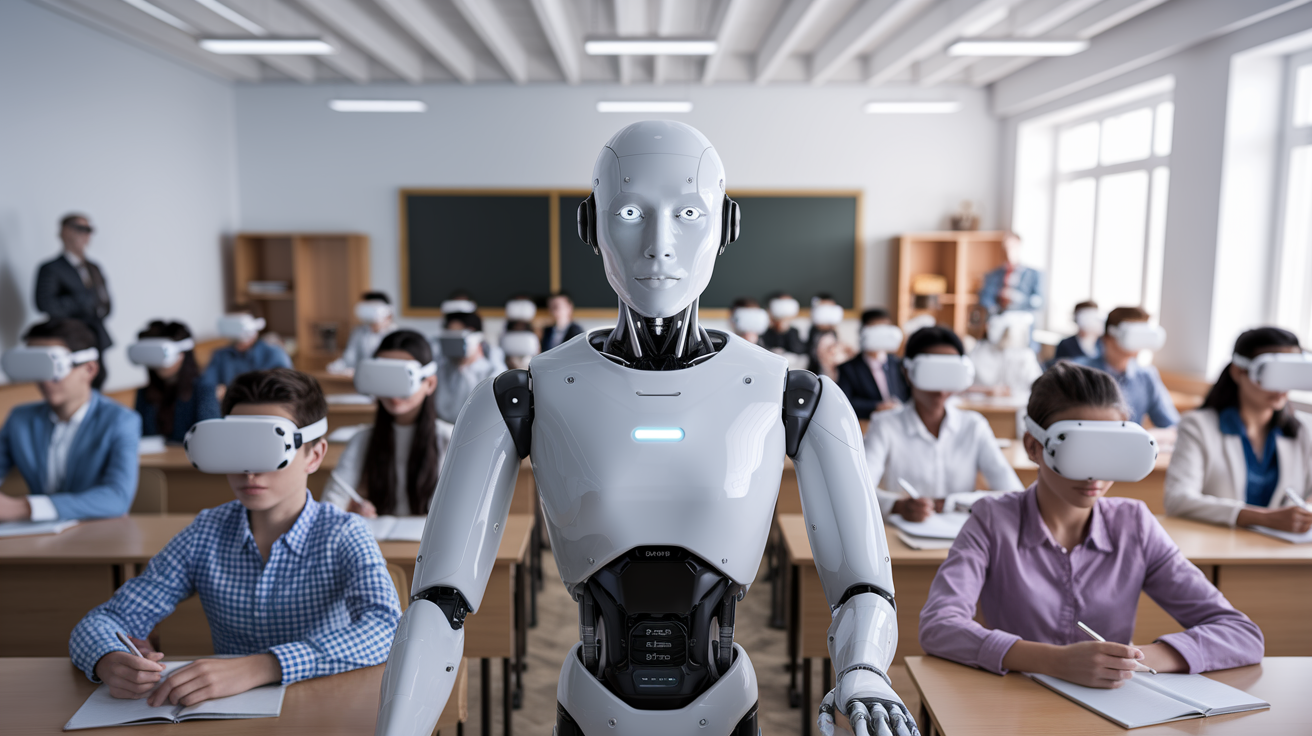By Short Stereo
In 2025, AI educators are poised to take a significant role in education, providing a transformative impact on both students and teachers. AI-powered systems will begin replacing traditional teaching methods in many classrooms, leading to a more personalized and data-driven approach to learning. The ability of AI to cater to diverse learning needs and provide real-time feedback makes it an exciting addition to education, but it also raises many questions and challenges about the role of human teachers.
In this article, we’ll explore how AI educators are replacing teachers, the benefits and challenges of this transformation, and how businesses can adapt to this change in the education sector. You’ll also gain insights into the future of education and actionable strategies for integrating AI into your business model.
tl;dr – What’s in the Article
This article covers the rise of AI educators, the potential benefits they bring, and the challenges associated with their implementation in education. It highlights the ethical concerns surrounding AI in education, its impact on traditional teaching methods, and offers practical insights for businesses and educators looking to adapt. By the end of this article, you’ll understand how AI will reshape the educational landscape by 2025 and how you can leverage this technology for business growth.
Index Topics
- The Rise of AI Educators in 2025
- Benefits of AI Integration in Education
- Challenges and Ethical Considerations
- Impact on Teaching Methodologies
- Actionable Insights for Businesses and Educators
1. The Rise of AI Educators in 2025
Introduction
As we move toward 2025, AI educators will take on more responsibility in classrooms, both in K-12 schools and higher education settings. These AI-driven systems are designed to enhance the learning experience by delivering personalized content, assisting with grading, and even offering tutoring services. The primary goal is to provide an individualized approach that addresses the unique learning pace of each student.
AI educators are expected to offer significant benefits, such as reducing teacher burnout and providing consistent, 24/7 support for students. However, the idea of replacing human educators with AI also brings up concerns regarding the loss of human connection in education.
Actionable Insights
- How Startup Businesses Can Apply: Startups in the educational technology space can develop AI-powered tools that offer personalized learning paths for students. These tools could help in everything from language learning to advanced science courses.
- Strategies: Focus on creating adaptive learning platforms that can adjust content and difficulty level based on real-time student performance. This strategy will allow educational institutions to cater to the individual needs of every student, making learning more effective.
- Tip: Make sure to create interfaces that are user-friendly, intuitive, and easy for both educators and students to use. Simplicity is key to adoption.
- For services from Short Stereo, visit shortstereo.com to explore how we can assist in creating AI-powered solutions for your educational initiatives.
2. Benefits of AI Integration in Education
Introduction
The integration of AI into education will bring numerous benefits that make teaching and learning more efficient. One of the most significant advantages is the ability of AI to provide personalized learning experiences. AI algorithms can analyze student data, identify strengths and weaknesses, and tailor lessons and quizzes to meet specific needs. This personalized approach can improve student outcomes and help struggling learners succeed.
Moreover, AI can automate routine tasks, such as grading assignments and tracking progress, freeing up time for teachers to focus on higher-value activities like fostering creativity and critical thinking.
Actionable Insights
- How Startup Businesses Can Apply: Businesses can develop AI-powered platforms that help educators automate administrative tasks, such as grading, attendance tracking, and even individualized student feedback.
- Strategies: Invest in AI that can process large amounts of educational data and offer actionable insights, such as predicting which students may need additional help or offering suggestions for curriculum improvement.
- Tip: Focus on ensuring that AI’s capabilities are used to complement, not replace, human educators. While AI is an excellent tool, the human element remains crucial for effective teaching.
3. Challenges and Ethical Considerations
Introduction
While AI offers many benefits, there are also significant challenges and ethical considerations that need to be addressed. Privacy concerns are at the forefront, as AI systems rely on student data to function effectively. Ensuring that this data is protected is crucial to maintaining trust in AI-driven education.
Furthermore, the possibility of bias in AI algorithms is a pressing concern. If AI systems are not carefully designed, they could reinforce existing biases in education, such as under-representing certain groups of students or misinterpreting their needs.
Actionable Insights
- How Startup Businesses Can Apply: It’s important for AI-focused startups to implement strict data security protocols and ensure their algorithms are free from bias. They should also work on transparent AI that educates users about how their data is being used and stored.
- Strategies: Develop partnerships with educators, data scientists, and ethicists to create AI solutions that are transparent, accountable, and fair. Collaboration can help ensure AI technologies are ethically sound and effectively implemented in educational settings.
- Tip: Regularly audit your AI tools and make adjustments as needed to avoid any unintended biases or security lapses.
4. Impact on Teaching Methodologies
Introduction
AI is set to revolutionize teaching methodologies by shifting the focus from one-size-fits-all approaches to more individualized learning strategies. Teachers will no longer be bogged down by administrative tasks like grading; instead, they can focus on mentoring and guiding students. AI can take over repetitive tasks, such as testing and administrative duties, while teachers focus on critical thinking, creativity, and emotional intelligence—areas where human teachers excel.
AI will also enhance the teacher-student relationship by providing data-driven insights into a student’s learning habits, helping educators customize their teaching approaches more effectively.
Actionable Insights
- How Startup Businesses Can Apply: Create AI systems that assist teachers by providing real-time student data. For example, an AI assistant that offers suggestions for lesson modifications or additional resources for struggling students.
- Strategies: Invest in training for teachers to understand and effectively use AI tools. Creating an AI system is only half the battle; educators need support to use it to its full potential.
- Tip: Build AI systems that encourage collaboration between educators and technology. The goal should be to augment, not replace, the teacher’s role.
5. Actionable Insights for Businesses and Educators
Introduction
For businesses looking to integrate AI into their educational models, understanding the practical applications is critical. It’s not just about creating AI systems; it’s about ensuring they meet the evolving needs of educators and students. This section will provide actionable insights for how both businesses and educators can adapt to the changing educational landscape.
Actionable Insights
- How Startup Businesses Can Apply: Build AI-powered solutions that can easily integrate into existing educational systems, whether for online learning platforms, schools, or universities. Focus on AI tools that can be adapted to meet specific needs, such as special education or advanced placement courses.
- Strategies: Collaborate with schools and universities to pilot AI tools in real-world classrooms. Gathering feedback and iterating will help improve the effectiveness and accessibility of AI-powered educational solutions.
- Tip: Stay ahead of the curve by continuously researching emerging AI technologies and educational trends to keep your solutions relevant.
Want More! Subscribe for Exclusive Insights and Premium Access
Unlock the secrets to educational success and more! Subscribe to our newsletter and get in-depth analyses, detailed case studies in PDF format, and exclusive insights delivered straight to your inbox. As a subscriber, you’ll also enjoy unlimited digital access to our resources, invitations to members-only events, and a range of exclusive perks designed to elevate your business. Don’t miss out—join our growing community today and stay ahead of the competition.
Subscribe Now for Unlimited Access! Subscribe Here
Additional Resources for 2025 Trends
Explore more in-depth insights and actionable tips with these additional articles:
- 5 Steps to Build a Social Media Marketing Strategy from Scratch in 2025
- How to Get Fashion Brand Collaborations for Fashion Creators in 2025
- What Are the Top 5 Interior Design Trends in 2025?
- How Your Business Can Make Opportunities from the Wedding Industry in 2025
- How to Measure YouTube Video Success with Crucial KPIs in 2025
- OpenAI Launches SORA Video Generation: What Free Text-to-Video Alternatives to Try in 2025?
- What is a Cute Website in 2025?
- What is a Robotaxi Business in 2025?
- How Is Brand Pricing Changing Due to Inflation in the Country in 2025?
- Why Every Influencer Starts a D2C Brand in 2025
- Why Brands Focus on Building Social Media Communities in 2025




